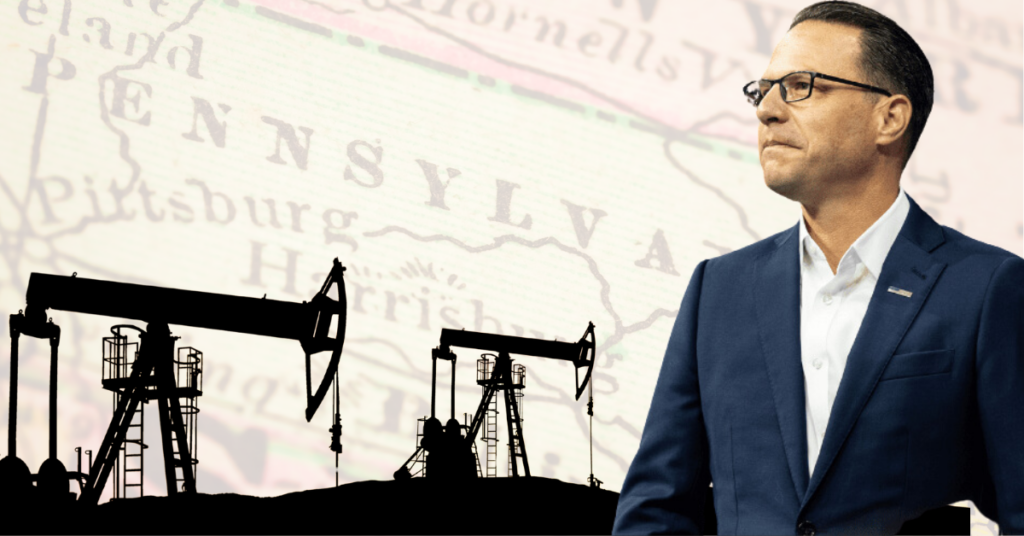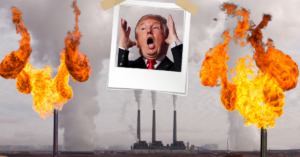|
Getting your Trinity Audio player ready...
|
With the incoming Trump administration planning rollbacks on climate progress, political leadership in heavy oil and gas-producing states like Pennsylvania must step up now more than ever. As Attorney General, Governor Shapiro stood up for families living on the frontlines of fracking with his 2020 grand jury report recommending measures to protect the public health of residents, including increased setback distances. As governor, Shapiro has addressed some critical pollution concerns, including prioritizing plugging orphan and abandoned oil and gas wells using federal funding and spearheading an apprenticeship program with United Mine Workers of America to train unionized labor to plug wells.

However, Shapiro also forged a partnership with a criminally charged fracking company, CNX, lending credibility to the company’s false claims that fracking does not harm public health despite hundreds of peer-reviewed studies to the contrary.
In 2025, we need Governor Shapiro and Pennsylvania legislators to further lead on climate and public health. Leaning on the federal government and federal funding is no longer a viable option. Instead, the Shapiro administration and legislative champions must be willing to take proactive steps to safeguard Pennsylvanians’ public health and climate as leaders in their own right. They can do so by:
- Expanding No-Drill Zones
Earthworks has spent the last decade proving that oil and gas operations pollute nearby homes and entire communities. In fall 2024, Earthworks joined several other groups as part of the Protective Buffers PA coalition to file a petition before Pennsylvania’s Environmental Quality Board (EQB) requesting the state’s Department of Environmental Protection (DEP) increase setback distances between fracking wells and homes, schools, hospitals, drinking wells, and surface waters. Requiring polluters to operate at a distance less harmful to people’s health, especially children, is a common sense approach that follows the science and the governor’s grand jury report. A state rulemaking would also build upon growing public support for such measures, including recent local expansions of setback distances in Cecil Township, Washington County.
- Developing a Strong Methane State Plan
The Shapiro administration can lead the way in reducing methane pollution from active oil and gas facilities by developing a strong state plan for the EPA methane rule finalized in December 2023. The EPA rule requires monitoring for leaks from wells regardless of size, using zero-emission process controller devices, eliminating routine flaring at large wells, and creating a Super Emitter Program. To ensure Pennsylvania’s forthcoming methane standards remain in effect even if the federal EPA rule is weakened, the Department of Environmental Protection (DEP) should make sure its plan relies on DEP’s state-based legal authority — the power DEP has been given through Pennsylvania law to make its own regulations independent of federal directives. A strong state plan would safeguard significant advances laid out by the EPA in 2023 and tailor the plan to Pennsylvania’s specific needs. Earthworks encourages the DEP to:
- Require quarterly instrument-based leak monitoring at all well sites that are not considered complex;
- Include separators – which separate gaseous and liquid components of oil and gas well streams – in the definition of complex well sites and hold them to monthly instrument-based inspections;
- Ensure quick repair timelines for detected leaks to reduce immediate harm to public health, safety, and the environment;
- Supplement EPA’s Super Emitter Program by creating a process for DEP to use new satellite data to reduce methane pollution, as well as to connect impacted residents with necessary methane monitoring and health resources and expertise to protect public health better;
- Create protective standards against flaring of associated gas for wells of all sizes that require thorough proof that other options are infeasible before flaring is allowed;
- Submit the SIP proposal as soon as possible, before the 2-year deadline of March 8, 2026.
A strong Pennsylvania state methane plan can realize and surpass the health and environmental benefits of the EPA methane rule, demonstrating strong Pennsylvania climate and public health leadership.
- Increasing Bonding Amounts for Oil and Gas Wells
Every year, oil and gas wells are improperly abandoned across Pennsylvania, venting hazardous pollution into surrounding communities, heating our planet with methane, and leaving taxpayers to foot the bill for cleanup. While Earthworks supports using federal funding to plug orphan wells in Pennsylvania in cases where no responsible party can be identified, more can be done to stop the abandonment of wells and accompanying pollution. In fall 2021, Earthworks joined several other organizations to file petitions before the EQB requesting that bonding amounts for unconventional and conventional wells be increased through a DEP rulemaking to reflect the true cost of well plugging. Over three years later, we are still waiting for EQB to release a report in response to our petition on unconventional well bonding. On the conventional side of the industry, Earthworks is involved in active litigation. It has been long since the Shapiro administration’s EQB prioritized this issue and built on its successes by well-plugging across the commonwealth. Without federal leadership on orphan and abandoned wells, Pennsylvania must take steps to address this issue at its root, starting where the nation’s first commercial oil well was drilled.
- Banning the Dumping of Toxic Oil and Gas Waste on PA Roads
The oil and gas industry refers to dumping oil and gas wastewater to tamp dust on unpaved roads as “road spreading.” It is a scientifically unsound, ineffective practice that poses significant, documented environmental and public health risks. Oil and gas waste contains varying amounts of heavy metals, radioactive materials, and other pollutants, some of which are carcinogenic and threaten human health and the environment.
In 2018, the PA Department of Environmental Protection (DEP) agreed to pause permitting the practice, but the agency stopped short of issuing a formal ban. As a result, the dumping continued. Between 2018 and 2021, operators self-reported dumping 3,259,405 gallons of wastewater on Pennsylvania roadways.
A 2022 report commissioned by DEP found the wastewater is only about as effective as rainwater as a dust suppressant and can even destabilize roads, leading to more dust than an untreated road. The report also found that runoff from roads treated with wastewater contained radium, a known carcinogen. The report’s co-author ultimately concluded, “While we must be willing to accept the tradeoffs between the benefits of dust suppression and the drawback of the environmental impacts, this research has found that oil and gas wastewaters only provide drawbacks.”
Pennsylvania needs to do more to prevent the dumping of this waste on roads across the Commonwealth. The permitting moratorium has proven insufficient to deter some waste producers from continuing the harmful practice. Earthworks looks forward to working with community members, legislators, and the administration to ban road spreading for good in the new year.
- Closing the Leachate Loophole
Leachate is a liquid formed when rainwater filters through wastes disposed of in a landfill. The liquid leaches or draws out chemicals or other constituents from those wastes.
Pennsylvania has over a dozen wastewater treatment facilities that process leachate from landfills that accept oil and gas waste. However, wastewater treatment plants where landfill leachate is sent for disposal do not generally monitor for known cancer-causing substances like Radium-226 and Radium-228 and other dangerous contaminants found in oil and gas waste before release into rivers and streams. Unsurprisingly, a 2023 study found higher levels of radioactive materials downstream from wastewater treatment plants that processed leachate from landfills that accepted oil and gas waste.
The Shapiro administration should require anyone who stores, processes, or disposes of residual waste to test leachate before discharge into waterways, ensuring treatment facilities are not polluting the freshwater resources Pennsylvanians depend on.
The prospect of an incoming Trump administration is daunting, to say the least, but states like Pennsylvania are well-situated to fight back. A lot can be done at the state level to protect people and their environment. It just takes political will. At Earthworks, we are excited to work with Pennsylvania’s leadership to capitalize on those opportunities to improve the lives and health of communities.

